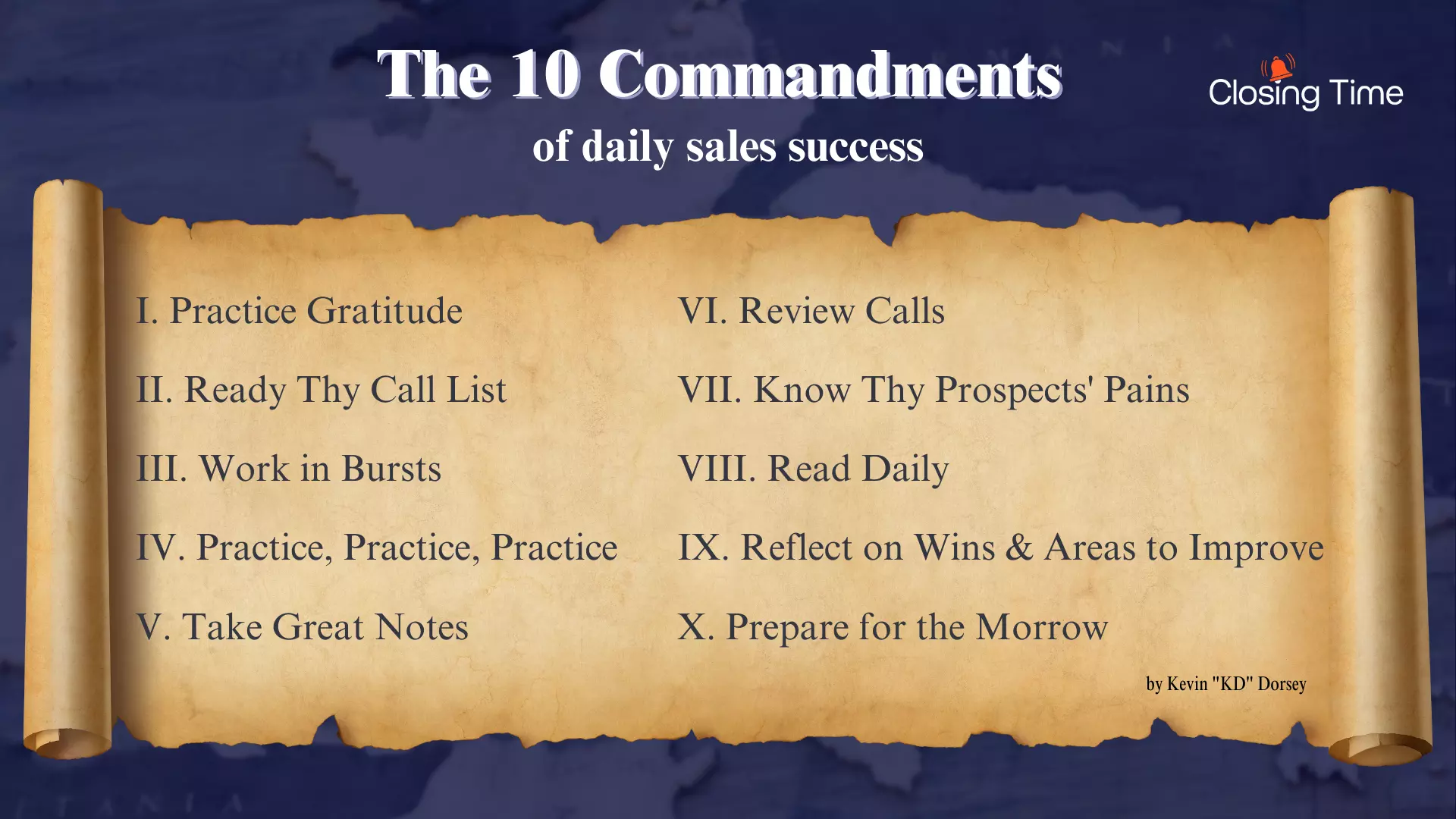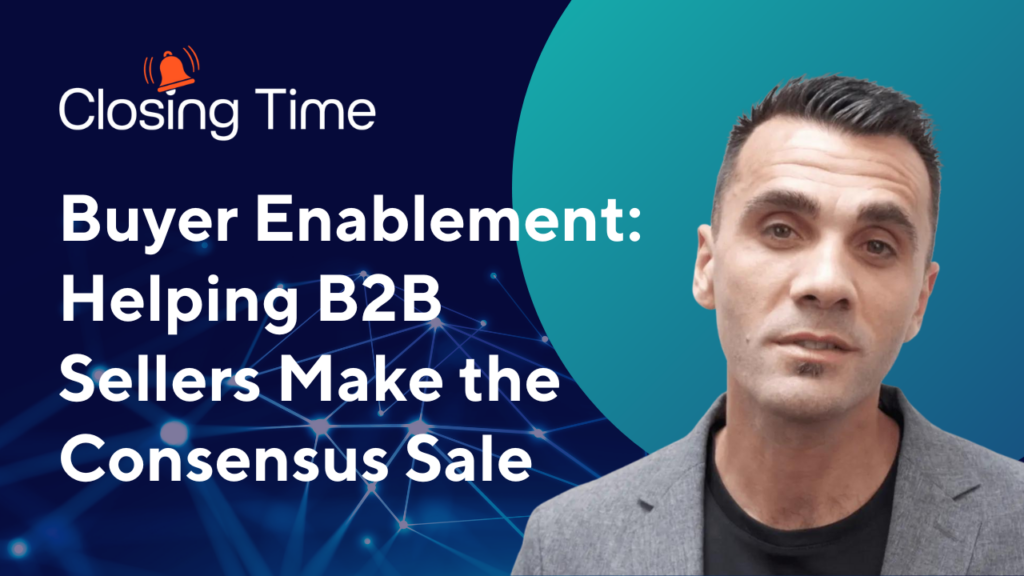What daily sales habits separate top performers from the rest.
We’re sharing Ten Commandments that can elevate your sales game.
In this episode of Closing Time.
Thanks for tuning into Closing Time the show for Go to Market Leaders.
Val Riley, VP of marketing for Unbounce and Insightly.
Today, I’m joined by Kevin Dorsey.
He’s a SaaS sales consultant, a keynote speaker and a sales leadership coach.
Welcome to the show, Kevin.
I’m pumped for this.
I love closing time. Right?
So if we get to talk about things that can close
this will be good,. So thanks for having me.
Let’s do it.
I love the energy.
So, Kevin, regardless of industry,
territory or quota, all salespeople have the same constraint.
24 hours in a day.
Why do you believe on focusing
on the small daily habits is important for long term success?
I’m a big first things first type leader
and first things first type, you know, I’ll say individual.
like there’s so many things that you can be doing or should be doing,
but there’s just foundational things that if you do help everything else.
And I think, you know, I’m a big fan of simplifying things.
There’s hundreds of things that you can do during the day.
But if you can narrow it down to ten things that impact
everything else, you know,. I think it’s important.
That’s kind of where the Ten Commandments idea came from is like the
you know, whether you’re religious or not,
whatever else, they are just some pretty good principles.
Regardless of how you operate, that if you focus on,
will impact the rest of your life.
So that’s kind of how I look at it’s the day in, day out.
Keep it simple, but then that’s what builds the momentum that we need.
Awesome.
Okay, so I’m
envisioning this list is going to be taped to someone’s wall or computer.
Let’s start at the beginning.
It’s the beginning of the sales reps day and commandments
one and two are practice gratitude and read thy call list.
How do these activities set the tone for a really productive day?
So the gratitude is where I think it all starts, because there’s actually
so much science behind gratitude and what it does for our brains
and what it does for how we view the world and how we operate.
One of my favorite books on this topic is called The Happiness Advantage.
And what they talked about in that book is how you can rewire your brain
to be more positive and in the book, there was a massive study done
that showed positive minded sellers sell 37% more,
37% more than negative or neutral minded sellers, 37%.
That’s real money. Right.
Well one of the best ways to develop a positive mindset is gratitude.
So that’s where it starts writing 2 to 3 new things per day.
What you’re grateful for and feeling that emotion.
Right?
And then once that’s ready, we move to that call list, right?
And so the call this is, you know, ready they call list.
Do you have your call list ready?
Too often reps come into the day and now they’re trying to figure out
who they’re going to call.
That should have been done already.
So when I walk into the day, I’m going to get my mind right,
and then I already know who those first 50 calls are going to.
And that helps me start the day on the,. I guess with the momentum and focus
that we need, because funny enough, you know, 24 hours
is actually a lot of time if you think about it, we all like, to me
the constraint is not hours, it is focus you use that word in the intro, it’s
actually focus is the constraint.
That call list allows you to stay focused.
That’s number one and two, gratitude and get that call list ready.
That’s how you start.
Okay.. No one’s arguing with that 37% figure.
That’s amazing.
So you’ve already got me hooked.
Let’s go on to number three.
It speaks to every rep’s least favorite task, cold calling.
And you talk about working in cold calling bursts.
Yep. And so you can see how they all build on each other.
So, like one cold calling is easier when you know who you’re going to call.
That’s why the call list is ready.
And then once it’s there, you can work in bursts.
And so our brains love completion and our brains love working down in numbers.
But also you can only do so much in a row before the quality comes down.
And so a lot of sellers, you know,
they’re going to make 50 calls or they’re going to make 100 calls in the day.
But when you count up your brain, really doesn’t like because it’s
an infinite ending, whereas if you’re counting down, it goes through it
and it’s easier for the brain to handle five bursts of ten, then make 50 calls.
And so working in bursts, ten calls, shake it out, ten calls,
shake it out, right, get outside, walk the dog real quick, come back in.
But it allows you to get through it faster.
Whereas when reps try to like, go for like 2 hours straight
making calls, it’s actually too much cognitive load.
There’s actually
too much happening there to do that well, so that’s what the bursts are all about.
50 on, ten off, 50 on, ten off.
I don’t generally speaking,. I don’t do hour meetings anymore.
50, to give one, a little bit of space
in between and to make sure we get more things done.
Yeah, two great tips there.
I mean, I love crossing things off a list.
Just speaks to my heart.
So yeah, counting down. I think is a really effective mindset.
Okay, so the next one has proven to be effective, but feel like it
often gets overlooked.
It’s practicing, particularly roleplaying with peers and your sales leaders.
Well, it’s funny because you mentioned it, right?
There’s like, you know, cold call.
You know, people hate cold calling, rep’s hate cold calling.
Well, one of the reasons
why a lot of reps hate it is because they’re not very good at it.
Right.
Like, it’s actually hard to enjoy something that you’re not good at.
And the only way to get good at something is practice.
And this is truthfully, in my opinion,
one of the biggest flaws in the sales industry is this aversion
to practice, right?
Whereas your sport in high school, you practiced every day,
your instrument, you practiced every day, your band.
You practiced every day. Right.
But then you get into selling.
You know, the thing
that will actually make you multiple six figures in a year and people don’t.
And so this to me is like this, I think helps cure some of that in anxiety.
And some of that fear is like, when you know what you’re doing
and you’re good at it, it’s easier to execute on.
So practice is just every day,. I’m going into the office.
When I was selling,. I was practicing every morning
just with myself, like, all right, what objections might I face today?
Let’s let’s get that going.
So practice is one of the fastest ways to get better at selling.
And most people just don’t do it enough.
That’s a really great tip.
I do feel like.
We’re onboarding some new sales reps right now
and the focus is how quickly can we get them trained up and on the phones?
But really we have to make sure we’re giving them ample time
to practice their craft, not only in that ramping stage, but
like throughout the time that they are a rep with us.
So huge, huge tip there. Okay.
Next for touching on every sales leader’s biggest pain
and this cuts to the Insightly folks extra sharply its updating the CRM.
Taking great notes, Gosh
if our sales reps knew how often I read their notes,
I think they would know that I’m their biggest fan.
How do you get sales reps to take great notes and then put them in the CRM?
So there’s a few ways.
One, you have to make it easy to do in this CRM, right?
Like, are the fields there for them to update?
Can you create dropdowns where it makes sense?
What fields can you make mandatory, right?
Can you plug in with some of the tooling to capture those notes for them?
Right.
So one is like how you build out this CRM.
Is it intuitive?
Is it easy for them to do and to actually enter?
But then secondarily, you know, you mentioned it for it was so perfect
the way you said it is, if Sellers knew how valuable their notes
were to the company, it’s easier to sell them on it, right?
When it’s like because you’re on, I don’t you
know, sellers are complaining about like, you know, leads from marketing.
Well, you know what?
If you put notes in there, marketing could actually read it
and make adjustments to what we’re targeting.
This is happening in my org right now.
Right now, where they’re like,. Oh, these leads suck.
Everyone’s coming in to, you know, and they want X, Y, Z.
But then I pull up all the dispositions and I go,
That disposition only makes up 4% of leads.
I can’t go to marketing and say anything is wrong.
That’s 4%.
So you have to sell them on the impact.
It’s not just to them, it’s to the entire company.
Those notes are good, but then you do have to enforce it.
You have to enforce it.
If managers are not going in there and looking
like where are the notes, where are the fields. Right.
You know, we won’t let something close out or I’ll
put someone on a plan for it, it’s part of the job.
It’s part of the job.
But this is a key one.
Sellers, Please hear me out,
as much as you think you can remember everything, you can’t.
You don’t want to have to remember everything.
That’s actually what burns you out.
You want to be able to reference everything.
The better the notes, the better you’re going to sell, hands down.
All right, So
commandment number six also speaks to a marketer’s heart as well.
It’s about reviewing calls.
I love listening to calls.
So you specify that a rep should listen to one
winning call and one train wreck call every day.
Why is that reflection so important?. All right.
So I’ll start on the train wreck call because it
desensitizes you.
I think that’s the word, it desensitizes you to mistakes.
When you listen back to it, you start it just starts to whittle down
how much a mistake impacts you, Right?
If you can start to laugh at
where you messed up or laugh at where it all went wrong,
it makes it so much easier to do and not worry about.
So that’s one, you can learn.
Like, Oh yeah, I missed that one.
But then the win, same idea it reinforces.
So it’s interesting for reps and for managers, it’s
more often than not, they are not listening to the good calls.
They only listen to the bad calls.
And actually what that does psychologically is very interesting.
If all you’re listening back to are the calls that you didn’t do well on, it’s
reinforcing the things you didn’t do well on.
Whereas if you’re listening to the calls, it went well.
That’s actually what I want to reinforce.
Then I want you living that right.
So it’s doing both is very, very important
because I want to reinforce the good and laugh at the bad.
That’s what I’m looking for on call reviews, and I love that
as a marketer, you’re listening to calls because a lot of marketers don’t.
They don’t listen to calls, they don’t read notes.
They go off in their little marketing corner and go to marketing things.
So like, you got a fan over here, Val.
I’m liking it.
This is good. Awesome. Okay, great.
Let’s keep going because you have two hear that
highlight the importance of taking time for research.
Both understanding your prospect’s pains, that’s number seven.
And investing in your own professional development with daily learning.
That’s number eight.
I mean, both these fall into the education bucket, right?
How do you learn about your prospects?
And then what are you learning to make yourself better.
For whatever reason, especially in SaaS, this this area is
what got replaced by product knowledge.
It used to be when, back in the day, right, You got educated on
Prospect and the industry far more than you did the product.
But now that we’re in tech, it’s like all the playbooks, all the ongoing
is about the product and so little about the prospect.
Sellers selling to me
know next to nothing about what it actually means to be a CRO.
They don’t, they don’t understand what my day to day looks like.
They don’t understand the pain points. I care about.
They don’t understand where. I’m trying to go.
It’s like they can’t speak my language, right?
So you have to really dive in and understand what your prospects care about.
One of my favorite tools on this is called. The Buyer’s Matrix by Jill Konrath.
It’s a free tool.
You can download it, but it really forces you to get into the mind of the prospect.
So you got to learn there.
But then the second is like you’ve got to learn as a seller.
It still is very disappointing to me
how few sellers actually consume knowledge to improve themselves.
It’s just wild.
There’s so many great books, there’s so many great courses, there’s
so many great programs that you can go through.
But they just don’t.
I’ve been asked many, many times in my career why I haven’t written
a sales book, but my response has always been the same because sellers don’t read.
Like go look at an, especially recently,
if you look at any sales book that has been released over the last
4 to 5 years, the highest number of reviews will be like 120.
And they’re great books and it’s just people
they just don’t read them like sellers, read, read, Influenced by Cialdini,
read Gap Selling, read Cold Calling. Doesn’t Suck, read Fanatical Prospect,
read Methods of Persuasion, read Pre-suasion, Flip the Script,
What Great Salespeople Do, Brain Scripts for Sales Success, like if you go consume
those things, you’re going to be a better seller.
And they just don’t.
So that’s daily, ten pages a day.
If you read ten pages a day, you will finish at least two books a month.
Go for it.
Yeah it doesn’t sound like it’s too high of a mountain to climb.
Also, you know what we’re doing right now?
Maybe you’re more of an auditory person,. You know, when you’re out for your run
or walking your dog, throw on a podcast, you know, just there’s
a lot of ways to learn.
Books are great, podcasts are great, but just do something right.
That’s the message.
It is with one caveat. I’m going to throw one caveat.
The reason why the commandment is read is because retention is better with reading.
The problem with podcasts for retention is more often than not,
we’re doing something else,
we’re driving or working out, and so we don’t have the full focus
and attention and so it’s just something where we’re making sure that you do both.
Like consume knowledge, but make sure you’re
consuming it to retain it, not just consuming it.
Like, Oh yeah, I listened to a podcast.
Take notes, write it out.
What are you going to do with it?. That’s the key.
Fair point. Fair point.
Okay.
Let’s say we have reached the final hour of our workday
and we have two more commandments that are going to help sellers reflect
and prepare for the next day.
Those are the last two, right?
Like now we’re at the end of the day and hopefully people can see
how these commandments stack, right, is
like how we started our day and how we ended.
Reflect, what went well today?
Again, you can see that the pattern. I’m trying to do here is to reinforce
the good.
What went well?Because when we reinforce it, we’re more likely to keep going.
We’re more likely to do it again.
Just like what went well today?
I had a great conversation with a marketer that actually likes to listen to sales
calls. That was cool.
You know, like I had a good one on one with like one of my reps.
And then also like, where did I miss today or what were things
that I wanted to accomplish today that I didn’t?
Where did I get distracted?
Like, where did I get off pace?
Right?
And then I can reflect and then prepare for tomorrow, right?
More often than not, people just aren’t prepared to have a great day,
that’s what’s wild, they’re just not prepared for it,
they didn’t actually plan a great day in advance, and we have to.
So sitting down and
this is when that call sheet gets ready, this is when my call list gets built out.
This is where I’m blocking my calendar to do the things necessary to succeed.
Because then that’s what actually let’s you unplug afterwards.
This is another thing sellers and leaders just miss all the time is the reason
why you’re up, the reason
why your brain is spinning is because it’s trying to remember everything.
Whereas if you already wrote everything out, here’s
what I’m going to go do tomorrow,. I promise
you you’re going to sleep better.
I promise you’re going to be more present with your family, with your partner,
with your wife, with your husband, whatever,
because you’re not trying to remember.
I know what tomorrow is like.
We’re recording this on a Friday,. I end every week, every week, my last 90
minutes of the week is a full recap of the week
and planning my next week.
So when I shut down the laptop
Friday evening,. I already know what next week looks like.
So I think you can imagine how much better my weekends are
and how much easier it is for me to actually relax a little bit.
Because I’m not like, Oh man, when am I going to have that tough convo?
Or, Ooh, I got to build this report out.
It’s already there.
So that’s how you wrap the day. Review it.
What went well, what could you make a little bit better tomorrow?
But then plan tomorrow.
Don’t log into the day hoping it’s going to go well.
Prepare for it.
I really like that tip.
I sometimes I find that replaying the day in my head
because sometimes you have meetings back to back to back, like that’s
just the way it is
and you don’t really have time to process what happened during those meetings.
But replaying the day in your head, making notes about what went well
and what didn’t, To me, that is exactly the output that you described.
It just helps you have a better evening and a better weekend
because you have taken some time to like to wrap up what happened.
Exactly.
That’s all.
That’s all it is.. And this isn’t a lot of time.
Could be 20 minutes. Right? Right.
But that 30 minutes at the end of the day will make your next day so much better.
Kevin, this was great.
Thank you for sharing your Ten Commandments
and we really appreciate you joining us on closing time.
Thanks for having me.
Awesome.
And thanks to all of you for joining us today.
Remember, you want to like the video, subscribe
to the channel and hit that bell for notification so you don’t miss an episode.
We’ll see you next week.





